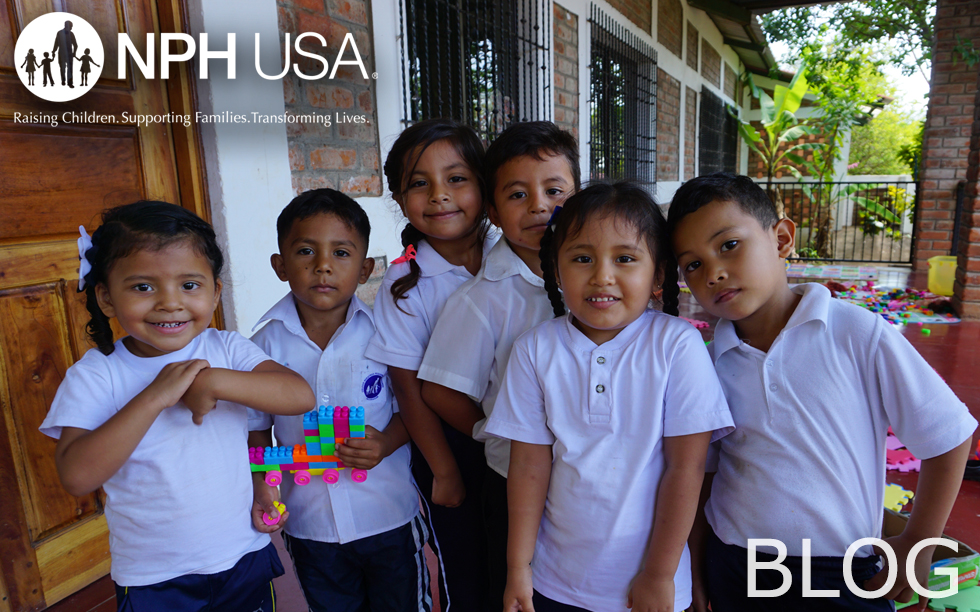Below is a blog post written by wonderful supporter, Ursala Houser, about her recent trip to NPH DR. You can also check out Ursala's beautiful photos from her trip on her site here.
On the first day we arrived it felt like time stood still for us. I swear I got more accomplished in that one day than I would have in a week here in the states. We stayed at NPH orphanage in Santo Domingo, Dominican Republic. We arrived at night, while everyone was sleeping. The next morning our wonderful Tia (house mom) made us breakfast, porridge and fruit. Now this wasn’t just any porridge. If you ask my husband, it was the “just right” porridge that Goldie Locks talks about in the story of the Three Bears. Twenty-five minutes later I was sitting in my very first Spanish mass. Something about hearing the liturgy in Spanish made it so much more beautiful.
After mass, a quick tour of the orphanage and then lunch. Lunch was a humbling experience because we were allowed to eat with the children. My family got to eat with the baby house, which was the kids who were between the ages of 3-5. When we arrived we were welcomed by some of the most polite children you will ever meet. They took their eating seriously, not one of them played with their food. When they were done eating everyone of them picked up their plates and put them in the sink. AMAZING! Can I sign my kids up? When they were done they did chores and then we all played outside.
On the first day being offered the same meal as the kids I felt guilty. I shouldn’t be taking food from these beautiful people. To see the expression of joy on the kids’ faces as they partook of the exact same meal that they ate every day, beans and rice, was something EVERY American should see. Needless to say my daughter, Ana, and I cried into our beans and rice that day. After lunch and playtime we went to our rooms and debriefed. That afternoon we took some of the kids to the beach and later that night we went to the director’s house for dinner. Seeing how our different cultures mesh together was perfect. We sang songs, and by the end of this very long day I felt like I was home.
The next day posed a different sort of challenge. We had made plans to go into the Batey and work within little village outside of the orphanage to help build a house for a family. A Batey is a sugar workers' village. The men in the village all work in the cane fields, and the women stay at home and raise the children and cook. In these more modern times, that definition was a little looser, but most families stuck to the traditional customs. When we arrived to start building we didn’t know what to expect. My husband is very knowledgeable in the building process, but he soon realized that the American way had no place in the Dominican Republic. The “Dominican Way” was king and cement trucks that mix the concrete for you were a luxury. Here you used the ground to mix the concrete. The supplies were limited, and nothing was wasted, and my husband learned from a boy who was just a bit older than our son, how much water, sand and cement to use. Humbling, yes, but also inspiring.
As Americans we sit in our world thinking that the people in other countries are poor because they are lazy. Not true. The people in the Dominican were very industrious. Besides that, they don’t have the luxury of being lazy. If they don’t cook, they don’t eat. If they don’t build, they don’t have a place to live. The young men were taught young how to build and work with their hands. In the same manner the little girls are quickly taught by mom how to maintain a household. Schooling is reserved for the rich, as there is no public schooling system, and it costs a great deal of money. In the orphanage the children had godparents from the States and Canada who help cover these costs, so their lives were much different than the children in the Batey. So, unless there was outside intervention, if you are born poor, you know that your life is going to be one of hard work and labor.
Depressing? Nope! I must say that the first day in the Batey I experienced a wave of emotions; empathy, compassion, and this last one was strange for me, envy. As I played with the kids all barefoot, I realized something; this is true happiness. This is true freedom.
At one point on that second day one of the men took a little break and came and played with us. My daughter and I were doing bubbles with the little ones as their father (later I learned his name was Sandy) looked on with curiosity. I asked him if he wanted to join in and he said that he didn’t know how. I told him I would teach him, and 5 seconds later I watched him blow his first bubble. So often we feel like we have to do great things to change the world, but at that moment I had the epiphany that little things bring great change. Now, I’m not saying that bubble changed Sandy’s life, but it sure did change mine.
Here is a slideshow of Ursala's photos from her trip.
Here is a slideshow of Ursala's photos from her trip.
